- Clone
- 16A1 (See other available formats)
- Regulatory Status
- RUO
- Other Names
- Platelet-derived growth factor receptor, alpha polypeptide, PDGFR2, PDGFRα, PDGFRa, PDGF receptor alpha
- Isotype
- Mouse IgG1, κ
- Ave. Rating
- Submit a Review
- Product Citations
- publications
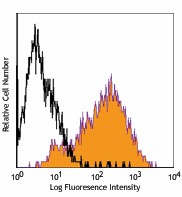
-

Human PDGFRA transfected cells stained with biotinylated 16A1, followed by Sav-PE
| Cat # | Size | Price | Quantity Check Availability | Save | ||
|---|---|---|---|---|---|---|
| 323503 | 25 µg | $94 | ||||
| 323504 | 100 µg | $211 | ||||
The 16A1 monoclonal antibody recognizes human CD140a also known as the platelet-derived growth factor receptor, alpha polypeptide, PDGFR2, and PDGFRα. CD140a is a cell surface tyrosine kinase receptor for members of the platelet-derived growth factor family. The identity of the growth factor bound to the receptor determines whether the functional receptor is a homodimer or heterodimer composed of both PDGFR-α and -β. CD140a contains three immunoglobulin-like domains and a tyrosine kinase domain with a predicted molecular weight of approximately 123 kD. CD140a is widely expressed on a variety of mesenchymal-derived cells and has been implicated in the development of some tumors including basal cell carcinoma and gastric stromal cell tumors. Binding of A-chain containing PDGF molecules as well as protease-activated PDGF-C molecules can stimulate cell proliferation. CD140a has been shown to interact with a number of proteins including CRK, Grb2, Grb14, SHP2, and others as integrin β3, caveolin-1, and nexin sorting molecules. The PDGFRα is heavily phosphorylated on numerous tyrosine residues through both autophosphorylation and ligand-dependent processes. The 16A1 antibody has been shown to be useful for flow cytometric detection of CD140a.
Product DetailsProduct Details
- Verified Reactivity
- Human
- Antibody Type
- Monoclonal
- Host Species
- Mouse
- Immunogen
- NIH 3T3 cells transfected with human PDGFRalpha
- Formulation
- Phosphate-buffered solution, pH 7.2, containing 0.09% sodium azide.
- Preparation
- The antibody was purified by affinity chromatography, and conjugated with biotin under optimal conditions.
- Concentration
- 0.5 mg/mL
- Storage & Handling
- The antibody solution should be stored undiluted between 2°C and 8°C. Do not freeze.
- Application
-
FC - Quality tested
- Recommended Usage
-
Each lot of this antibody is quality control tested by immunofluorescent staining with flow cytometric analysis. For flow cytometric staining, the suggested use of this reagent is ≤ 2.0 µg per million cells in 100 µL volume. It is recommended that the reagent be titrated for optimal performance for each application.
-
Application References
(PubMed link indicates BioLegend citation) - Product Citations
-
- RRID
-
AB_755997 (BioLegend Cat. No. 323503)
AB_755997 (BioLegend Cat. No. 323504)
Antigen Details
- Structure
- Cell surface tyrosine kinase receptor for members of the platelet-derived growth factor family.
- Distribution
-
Widely expressed on a variety of mesenchymal-derived cells.
- Function
- Stimulation of cell proliferation; mitogenic activity for cells of mesenchymal origin. Knock-out studies have implicated an essential role for CD140a in kidney development. Has been implicated in basal cell carcinoma and gastric stromal cell tumors.
- Interaction
- Interacts with Crk, as well as a variety of adaptor molecules and signaling intermediates (Grb2, Grb14, SHP2, others). Has also been shown to associate with integrin β3, caveolin-1, and nexin sorting molecules
- Ligand/Receptor
- Binds to A-chain containing PDGF molecules and protease-activated PDGF-C molecules
- Modification
- Multiple tyrosine phosphorylation sites (Y720, Y731, Y742, Y754, Y762, Y767, Y768, Y988, Y993, Y1018)
- Cell Type
- Embryonic Stem Cells, Mesenchymal cells, Mesenchymal Stem Cells, Neural Stem Cells
- Biology Area
- Angiogenesis, Cell Biology, Immunology, Neuroscience, Neuroscience Cell Markers, Stem Cells
- Molecular Family
- CD Molecules, Cytokine/Chemokine Receptors
- Antigen References
-
1. Gronwald RG, et al. 1988. Proc. Natl. Acad. Sci. USA 85:3435.
2. Gilbertson DG, et al. 2001. J. Biol. Chem. 276:27406.
3. Seifert RA, et al. 1989. J. Biol. Chem. 264:8771.
4. Rupp E, et al. 1994. Eur. J. Biochem. 225:29. - Gene ID
- 5156 View all products for this Gene ID
- UniProt
- View information about CD140a on UniProt.org
Related Pages & Pathways
Pages
Related FAQs
- How many biotin molecules are per antibody structure?
- We don't routinely measure the number of biotins with our antibody products but the number of biotin molecules range from 3-6 molecules per antibody.
Other Formats
View All CD140a Reagents Request Custom Conjugation| Description | Clone | Applications |
|---|---|---|
| Purified anti-human CD140a (PDGFRα) | 16A1 | FC,ICC |
| Biotin anti-human CD140a (PDGFRα) | 16A1 | FC |
| PE anti-human CD140a (PDGFRα) | 16A1 | FC |
| PE/Cyanine7 anti-human CD140a (PDGFRα) | 16A1 | FC |
| TotalSeq™-A0128 anti-human CD140a (PDGFRα) | 16A1 | PG |
| APC anti-human CD140a (PDGFRα) | 16A1 | FC |
| TotalSeq™-C0128 anti-human CD140a (PDGFRα) | 16A1 | PG |
| TotalSeq™-B0128 anti-human CD140a (PDGFRα) | 16A1 | PG |
| TotalSeq™-D0128 anti-human CD140a (PDGFRα) | 16A1 | PG |
| KIRAVIA Blue 520™ anti-human CD140a (PDGFRα) Antibody | 16A1 | FC |
Customers Also Purchased
Compare Data Across All Formats
This data display is provided for general comparisons between formats.
Your actual data may vary due to variations in samples, target cells, instruments and their settings, staining conditions, and other factors.
If you need assistance with selecting the best format contact our expert technical support team.
-
Purified anti-human CD140a (PDGFRα)
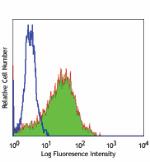
Human PDGFRA transfected cells stained with purified 16A1, f... -
Biotin anti-human CD140a (PDGFRα)
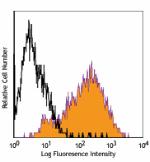
Human PDGFRA transfected cells stained with biotinylated 16A... -
PE anti-human CD140a (PDGFRα)
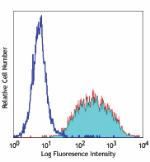
Human PDGFRA transfected cells stained with16A1 PE -
PE/Cyanine7 anti-human CD140a (PDGFRα)
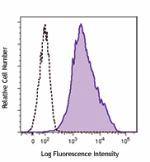
Human PDGFRα transfected NIH/3T3 cells were stained wi... -
TotalSeq™-A0128 anti-human CD140a (PDGFRα)
-
APC anti-human CD140a (PDGFRα)
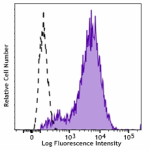
Human PDGFRα transfected NIH/3T3 cells were stained with CD1... -
TotalSeq™-C0128 anti-human CD140a (PDGFRα)
-
TotalSeq™-B0128 anti-human CD140a (PDGFRα)
-
TotalSeq™-D0128 anti-human CD140a (PDGFRα)
-
KIRAVIA Blue 520™ anti-human CD140a (PDGFRα) Antibody

Human PDGFRα transfected NIH/3T3 cells were stained with ant...

 Login/Register
Login/Register 







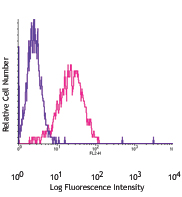






Follow Us